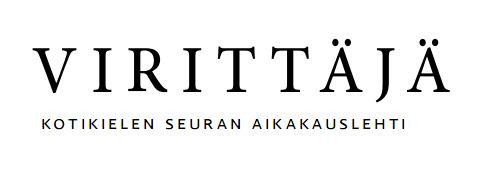Synonymia Helsingin slangissa
Avainsanat:
kaupunkikieli, metafora, sekakieli, semantiikka, slangi, synonymiaAbstrakti
Synonymy in Helsinki slang (englanti)3/2006 (110)
Synonymy in Helsinki slang
Synonymic expressions are common in Helsinki slang. The article examines the appearance of such expressions in Helsinki slang from three viewpoints: phonology, derivation and semantics.
Old Helsinki slang has featured a great deal of phonological variation, as a result of which many lexemes have had several phonological variants. The voiced consonants b and g, in particular, have been exchanged for voiceless counterparts (e.g. bragaa ~ prakaa [menn rikki] to break). Word-initial consonant clusters have also exhibited variation (e.g. kraga ~ kraka ~ skraga ~ skraka [kaulus, solmio] collar, tie). The lexeme rigi [puku] suit, attire has produced the greatest number of phonological variants, at 20 in all.
Most of the old slang words were derived from Swedish. They were not, however, incorporated into Helsinki slang unchanged but were modified by using various derivational elements to adapt them to the structure of Finnish words. There are altogether over 20 common derivational suffixes used in Helsinki slang. In many cases the same Swedish word has given rise to several slang words each with the same meaning (e.g. bolde, boltsi, boltsu, bolu [pallo] ball < Swedish boll). There are also more than 20 synonyms for forest in Helsinki slang, all derived from skog, the Swedish word for forest.
Helsinki slang has about ten conceptual fields that have functioned as centres of semantic attraction over the decades. The writer examines words belonging to four of these centres, namely tobacco, cigarette, girl and/or woman, country person, peasant and being annoyed. Words meaning girl and/or woman comprise the biggest group in Helsinki slang, numbering over 300 in all. There are some 150 words meaning country person or peasant, about 100 meaning tobacco or cigarette and also about 100 for being annoyed. Not all these words have been in use at the same time, however.
A distinct difference exists in the composition of the older and newer slang vocabularies, and this is evident in the analysis of the words in the study. A great many of the words in the older slang vocabulary are derived from different forms of Swedish: literary and standard Swedish; dialects of Finno-Swedish; and the Stockholm slang of schoolchildren and criminals. The majority of the newer slang vocabulary, on the other hand, consists of metaphorical expressions based on Finnish. The older slang features rather few metaphorical expressions.
Compared with the older slang words, the metaphorical expressions of the newer slang are often short-lived. For instance, the older words bna, friidu and gimma/kimma, all meaning girl and/or woman, have been in use for about a century, whereas many avian metaphors with the meaning of girl and/or woman, such as haahka eider, hanhi goose and kotka eagle, have had fairly brief lives. In many cases, the metaphorical expressions are based on productive analogical models and form an analogical semantic series. This is particularly clear in the metaphorical compounds for tobacco or cigarette and country person or peasant.
Two different layers can be distinguished in Helsinki slang: older Helsinki slang (known in Finnish as Stadin slangi), which was spoken from about the 1880s up to the 1950s, and the newer Helsinki slang, spoken since the 1950s. The older Helsinki slang was a mixture of Finnish and Swedish and constituted the lingua franca of the citys working class districts in which both Finnish and Swedish were spoken. In typological and functional terms it has something in common with pidgin and creole languages and various mixed languages. The newer Helsinki slang is in many ways a typical form of youth slang.
Heikki Paunonen
Tiedostolataukset
Julkaistu
2006-01-03
Numero
Osasto
Artikkelit
Viittaaminen
Paunonen, H. (2006). Synonymia Helsingin slangissa. Virittäjä, 110(3), 336. https://journal.fi/virittaja/article/view/40499





